This post may contain affiliate links. Please read our disclosure policy.

Hormones are a powerful force. They’re responsible for sending messages from one part of the body to another. And they communicate things that help to regulate your physical processes and behavior. While people only tend to think about hormones when they’re imbalanced, hormones are an incredible part of your physiology. Despite it feeling overwhelming and complicated, it’s actually possible to balance hormones naturally and support proper hormone function without the pill.
This is incredibly important for women of all ages because when your hormones are balanced, you feel balanced. Hormone balance manifests as regular cycles, stable energy and appetite, clear skin, good sleep and mood, and a healthy libido.
When hormones get out of whack, things can quickly fall apart. Each system in your body is interconnected. So, hormone imbalances can affect everything from sleep and skin to weight and mental health. If you’re struggling with symptoms of hormone imbalance, there are things you can start doing today to balance hormones naturally.
Jump to:
Hormone Imbalance Is Common But Not Normal
Hormone imbalances are becoming more common. Our modern lives make it pretty easy for hormones to get derailed. Most women are chronically stressed, nutrient deficient, not getting enough vitamin D and sunshine, don’t have time for exercise, and are trying to do too much on too little sleep. To top it off, the marketplace is saturated with endocrine disrupting chemicals in skin care, makeup, and cleaning products. But, just because hormone imbalance is common doesn’t mean it is normal.
The signs and symptoms of hormone imbalance are often overlooked or misunderstood by practitioners. They get dismissed as anxiety, part of aging, or being a woman.
If you’ve ever been told to just eat less and exercise more or to go on the pill to solve your problems, you’re not alone. Not only does it not treat the root cause, going on the pill to treat hormone issues often makes the problem worse in the long run. The solution is to resolve the root cause or trigger, and balance hormones naturally.
What is Hormone Imbalance?
First let’s get on the same page. What does it mean when your hormones are imbalanced?
Your three major sex hormones are estrogen, progesterone, and testosterone. Hormone imbalance occurs when one or all of these hormones are out of balance. All three are important, but estrogen and progesterone are especially important for women as they control the reproductive cycle.
It’s normal to have a range of progesterone and estrogen. It’s also normal for the amount of each to fluctuate with your monthly cycle. But at all times, they should be in balance. Too much or too little can cause major hormonal imbalances.
Types of Hormone Imbalance
There are essentially five ways in which sex hormone imbalance can occur:
- Low progesterone
- Low estrogen
- High estrogen
- High androgens
- Post-birth control syndrome
Your astute self might have noticed that I didn’t list high progesterone as an option. That’s because high progesterone isn’t generally possible unless you are taking supplemental progesterone.
Common Symptoms of Hormone Imbalance
There are a wide range of symptoms of hormone imbalance. Yours will depend in part by what type of imbalance you’re experiencing. Symptoms will also vary based on the extent of the imbalance (just how out of balance they are). They’ll also vary based on other underlying medical issues you might have.
Here are some common symptoms to look out for along with the type of imbalance they are typically associated with:
Low progesterone: Symptoms include exhaustion, insomnia, anxiety, mood swings, increased stress, compromised fertility, irregular or missing cycles, and PMS symptoms
Low estrogen: Symptoms include depression, confusion, hot flashes, vaginal dryness, bone loss, and brain fog
High estrogen: extreme PMS/PMDD, mood swings, anxiety, low fertility, fibroids, cysts, weight gain, headaches, fluid retention, bloating, low libido, estrogen dominance
High androgens: Hormonal acne, oily skin, excess body and facial hair, insulin resistance, weight gain, irregular menstrual cycles, and PCOS
Post-birth control syndrome: hormonal acne, hair loss, low libido, headaches, depression or anxiety, lack of ovulation and/or period, gas, bloating, gut dysbiosis, fertility issues
What Causes Hormone Imbalance?
Hormone imbalance can have a number of causes, but at its core, hormone balance relies on three things:
- Production: the amount of hormones you produce
- Ratio: the amount of hormones in relation to one another (the balance)
- Clearance: your body’s ability to clear or metabolize old hormones to make way for new hormones
Therefore, any change in the body that influences one or more of these three components can throw off your balance of hormones. Here’s some possible root causes of hormone imbalances:
Chronic stress
As humans, we all experience stress. But, when stress becomes chronic, it starts to affect other systems, including your hormones.
When you are chronically stressed, cortisol (our body’s stress hormone) is chronically elevated. Chronic cortisol output impacts almost every hormone in the body. Because the body perceives a chronic stressor is present, it goes into survival mode.
In this state, the body focuses on essential functions, and nonessential functions (like reproduction) are shut down. For many women, this means ovulation stops. Since ovulation is what triggers progesterone production, if you aren’t ovulating regularly, your body is unable to produce adequate amounts of progesterone. Chronic stress can also result in adrenal “fatigue”, impair thyroid function, and symptoms of estrogen dominance. It also makes it harder for insulin to work properly, which causes insulin resistance.
Impaired gut function
Your gut is home to over 100 trillion microorganisms. Over 70% of your immune system is in your gut, and it plays a key roll in helping to eliminate hormones.
A healthy gut and diverse microbiome are essential when it comes to balancing hormones. If you aren’t excreting used hormones through poop (there, I said it), you’ll actually re-uptake used hormones. Healthy gut bacteria also enhance GABA activity, which can help to balance mood and stress. GABA is a naturally occurring amino acid that works as a neurotransmitter in your brain and supports progesterone.
Chronic exposure to endocrine disruptors
According to the Environmental Working Group, the average woman uses 12 products containing 168 unique ingredients every single day. Most contain known endocrine disrupters, which can affect hormonal balance and fertility.
An endocrine disruptor is an ingredient that mimics natural hormones in the body like estrogens or androgens. When you apply a skin care product to your skin, some of those ingredients can be absorbed transdermally and make it into the blood stream. If the product contains known harmful ingredients or endocrine disruptors, they can actually contribute to hormone imbalances like estrogen dominance.
For example, oxybenzone, which is found in 40% of chemical sunscreens on the market, is linked to hormone disruption, breast cancer, negative birth outcomes, and reduced male fertility.
Testing for Hormone Imbalances
If you suspect you have hormone imbalances, the best thing to do is test, don’t guess. While a blood test is one of the most common ways to test hormone levels, a dried urine test such as the DUTCH test can provide a much more comprehensive look at both sex hormones and adrenal hormones. This will help you and your trusted medical provider better understand potential root causes.
If the signs and symptoms of a specific hormone imbalance fit you perfectly, you might be feeling a combination of relief and overwhelm. The only way to determine exactly what’s going on with your hormone levels is to test. However, if you can’t afford hormone testing right now, there are many things you can start doing today to balance hormones naturally.
How to Balance Hormones Naturally
1. Get off the pill
If you’re still on hormonal birth control and are experiencing symptoms of hormone imbalance, it’s time to consider getting off of the pill. The pill works by stopping ovulation and shutting down your own hormone production. Even if you bleed and have a period on hormonal birth control, you’re not ovulating.
Many women use hormonal birth control to manage symptoms like heavy periods and hormonal acne, but the pill only masks symptoms and exacerbates the problem. It does not treat the root cause of hormone imbalances. Long term, the pill can cause estrogen dominance.
When you come off of the pill, your hormone imbalances will still be present. If you want to stop taking the pill but are nervous about experiencing post birth control syndrome, check out How to Stop Taking Birth Control (Without Side Effects). For help with hormonal acne, check out Hormonal Acne: The Root Cause and How to Treat It Naturally.
2. Manage stress
I know it’s stressful when someone tells you to manage stress. But chronic stress must be managed properly in order for hormones to be in balance.
The first step is to identify what is causing chronic stress in your life. While we often point a finger at obvious stressors such as work deadlines and jam-packed schedules, there are a number of things that can cause chronic stress. These include undereating, fasting, and chronic dieting, overexercising, unresolved trauma, insufficient sleep, undiagnosed or unmanaged food sensitivity, excess alcohol and/or caffeine consumption, chronic infections, thyroid problems, chronic exposure to blue light, and lack of sunshine/low vitamin D.
Meditation and restorative exercise are great, but reducing stress will likely require a more comprehensive approach. Start by prioritizing sleep above all else. Try wearing blue blockers at night, turning off screens two hours before bedtime, going to bed early, and taking a high quality magnesium supplement.
If you’ve been on a strict diet and exercise routine, you need to scale back the intensity and/or frequency of your workouts and eat enough. You may also consider your carbohydrate intake, as increasing carbs like fruit and starchy tubers can actually support adrenal and thyroid function.
If unresolved trauma or general feelings of overwhelm are taking over your day, start seeing a licensed therapist to work through emotions and learn techniques to process them like EMDR.
You can also bring in support by offloading tasks like ordering groceries online or hiring a cleaning company. Learn to say no, and say it often. You can’t do everything yourself all the time, and if you don’t mitigate stress and/or remove what is causing you chronic stress, you won’t be able to balance hormones naturally.
3. Remove toxins
You know I’m passionate about this one. Cosmetics and cleaning products are the #1 way we’re exposed to endocrine disruptors. Endocrine disruptors mimic hormones in the body and contribute to hormone imbalances like estrogen dominance. The best and most effective thing you can start doing today? Check your skin care products for known harmful ingredients, and make the swap to safer skin care and cosmetic products. For a list of safe cosmetic brands, check out Best Clean Beauty Brands: Where to Start and What to Avoid.
It’s also important to make the switch to safer cleaning products. I love Better Life and Puracy, and they work just as good as their conventional counterparts. Remember, you’ll never remove all potential toxins from your life. There are dozens of environmental pollutants you can’t control, so focus reducing exposure where you can.
PS: I now write a monthly newsletter centered around understanding harmful ingredients in skin care and cosmetic products. Join my Clean Beauty Community to get it!
4. Love your liver
The liver is a powerful detoxification organ that plays an essential role in your body’s use of hormones. Your liver breaks down hormones that have been used in the body so they can be eliminated. You can support your liver and the detoxification of both hormones and toxins in a number of ways:
- Avoid or limit alcohol—alcohol puts a big strain on the liver, and impairs normal function
- Eat liver-supporting foods like leafy greens and cruciferous veggies daily
- Incorporate sulfur-rich foods like pasture-raised eggs and onions
- Include foods rich in heme-iron (animal-sourced iron) like grass-fed red meat and organ meat
- Consider milk thistle: Perhaps one of the most well-known liver-supporting herbs. Milk thistle is an herb that has active ingredients that may stimulate liver detoxification pathways and the regeneration of liver tissue.
5. Support your gut
If you are struggling with chronic digestive issues, it’s highly likely that you’re also dealing with hormone imbalances. To resolve the hormone imbalance, you must first start by improving gut health and digestion. While gut health is a massive topic that deserves its own conversation, there are some basic steps that will give you the most bang for your buck.
First, remove or reduce inflammatory foods from your diet. Foods like vegetable oils, and processed grains, dairy, and sugar can increase inflammation in the gut and lead to digestion and elimination issues. The best way to identify other potentially problematic foods is to do an at-home elimination diet as described in my book, Coconuts and Kettlebells.
Next, repair your gut lining. After removing foods that irritate the gut, introduce foods that can help repair any damage those foods may have done to your gut over the years. Two amazing whole food options are bone broth and collagen.
Lastly, add in nourishing foods that support gut health. Try to regularly incorporate probiotic foods, including raw sauerkraut, kimchi, and kombucha. These contain live probiotics that will help to populate your gut with good bacteria and support proper elimination. It’s also great to take a daily probiotic supplement. After a lot of research, my two recommendations are Gut Pro and MegaSporeBiotic.
If you have long withstanding gut issues that diet cannot resolve, it’s time to check your gut for infections or imbalances. I highly recommend working with a trusted practitioner to get a GI-MAP test and SIBO test to start.
6. Supplement wisely
I’m all about food first, but specific nutrients can have a profound impact on hormone imbalances, especially when nutrient deficiencies are present. There’s also a number of supplements and herbs that can help to balance hormones naturally.
While most of us can benefit from Magnesium and vitamin B6, it’s best to consult with a trusted healthcare provider before adding in new supplements, particularly if you have an underlying medical condition or take medications daily.
Magnesium
Magnesium is perhaps one of my favorite nutrients because it’s involved in over 600 reactions in the body! It plays a key role in supporting the stress response and hormone balance. Magnesium calms the nervous system and regulates the HPA axis (your control center for stress). It also normalizes the action of progesterone on the central nervous system. Research shows magnesium supplementation can greatly reduce PMS symptoms.
Magnesium also supports sleep, helps to manage blood sugar and insulin, and is anti-inflammatory. Perhaps most importantly, it fuels healthy mitochondria, which is important for hormonal health because steroid hormones are made in the mitochondria. Confused about the different types of magnesium? Check out Types of Magnesium: Supplements, Benefits, and Uses. I personally supplement with Magensium Breakthrough daily.
Vitamin B6
Vitamin B6 assists with the healthy clearance of both histamine (a common cause of PMS) and estrogen, and helps lower prolactin (another culprit for PMS symptoms). It’s also essential for the synthesis of steroid hormones, particularly progesterone. B6 is involved in the manufacture of important brain neurotransmitters that impact mood, including GABA, dopamine, and serotonin. As a water soluble nutrient, higher amounts, up to 50 mg per day, are well-tolerated.
Iodine
Adequate iodine stabilizes and down-regulates estrogen receptors. If you’re eating primarily a whole foods based diet, you may be lacking in iodine. Primary sources of iodine in the diet are seafood and dairy. If you avoid dairy and eat seafood infrequently, you may benefit from a supplement or eating seaweed snacks regularly. Breast tenderness is a common sign of deficiency.
Calcium D-Glucarate
Calcium D-Glucarate is a good option if your imbalance is driven by high estrogen. It helps your body detox excess estrogen by preventing the production of beta glucosidase by gut bacteria and by binding to and deactivating estrogen in the liver. Calcium D-Glucarate is not recommended if you have low estrogen, and can interact with alcohol and certain medications.
DIM
DIM is an antioxidant naturally produced by your body when you eat cruciferous veggies, but you can also take it as a supplement to promote healthy estrogen metabolism. Specifically, It helps your body produce more “good” estrogen and less inflammatory estrogen that is linked to cancer. It idea for those who are struggling with estrogen dominance.
Vitex
Also known as chaste tree or chaste berry, vitex is one of the most common herbs used to help balance hormones naturally. It works by increasing luteinizing hormone (LH), hence bringing on ovulation and a rise in progesterone levels. In my experience, it can be very helpful. However, I consider it a more “advanced” supplement that should only be used under the guidance of a skilled practitioner.
Ashwagandha
While it doesn’t directly impact sex hormones, ashwagandha is an adaptogen that can help your body overcome stress by moderating the brain’s hypothalamic-pituitary-adrenal (HPA) axis. The HPA axis produces and releases multiple hormones—including cortisol—that initiate your body’s response to stress. By helping to manage your stress response, it can indirectly support hormone balance.
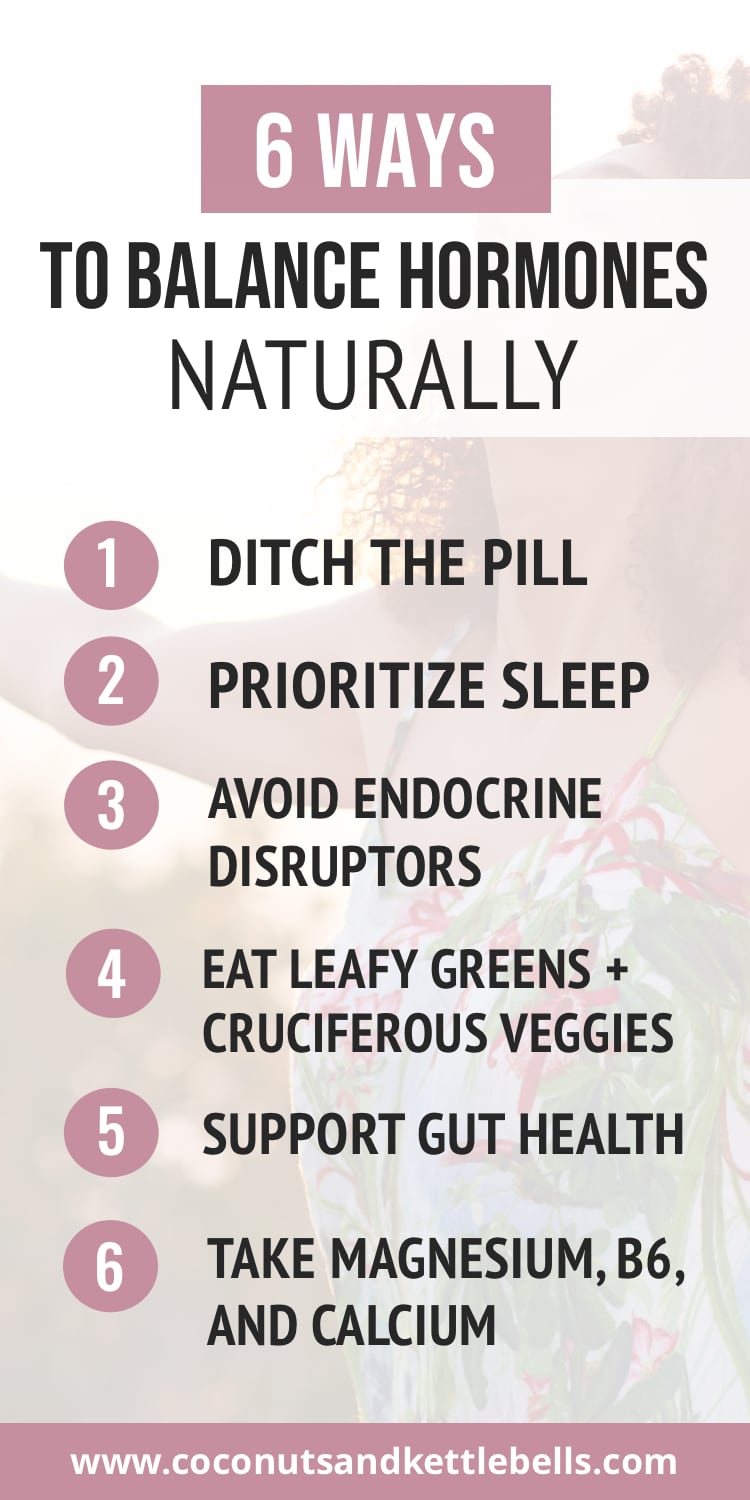
The Bottom Line
Hormones are at the cornerstone of your physical and emotional health. When they’re not in balance, the implications on your health and wellbeing are tremendous.
I hope these tips on how to balance hormones naturally are helpful in getting you on your journey to hormone balance and optimal health. Take these steps one at a time if needed, and have patience as the benefits build. Want more resources? Check out some of my most popular interviews with leading hormone experts:
- #140: Balancing Hormones, Irregular Periods and Fertility, & Winter Blues
- #213: The Pill, Irregular Periods, & Post-Birth Control Syndrome with Dr. Jolene Brighten
- #215: Fertility, Hormones, & Postpartum Health with Meg the Midwife
- #274: Biohacking Your Hormones with Alisa Vitti of Flo Living
- #327: How to Fix Period Problems and Hormone Imbalances Without the Pill with Lara Briden, ND
I love hearing from you! If you had success balancing hormones naturally, leave a comment below with your experience!
Be strong,

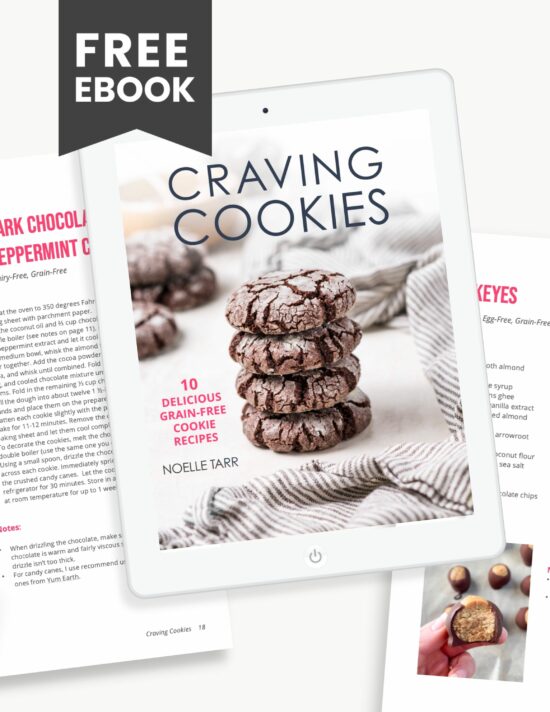

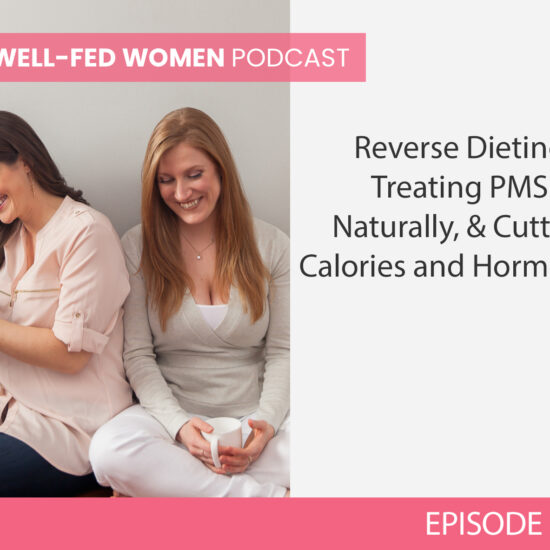
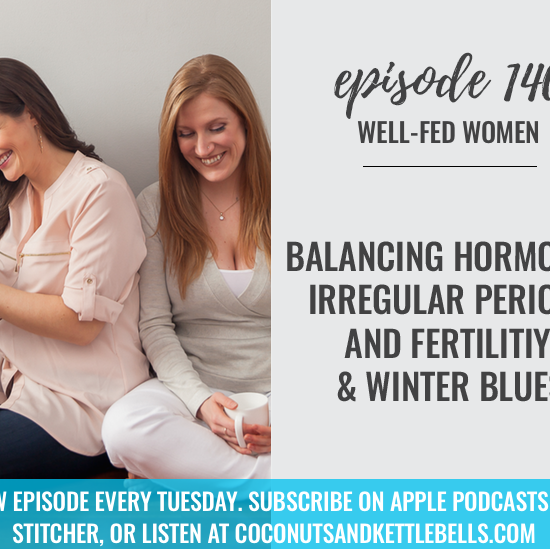
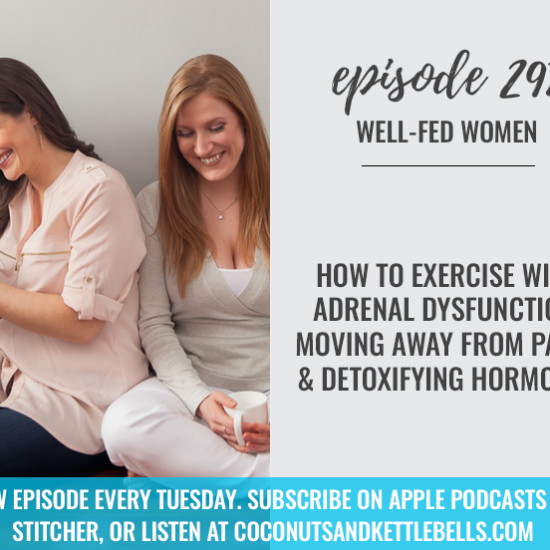
Beth says
Do you offer specific advice for post menopausal diet / exercise and hormone balance?
Noelle Tarr, NTP, CPT says
I do have some articles on perimenopause! See here: https://coconutsandkettlebells.com/natural-remedies-for-perimenopause-symptoms-supplements-treatments-diet/